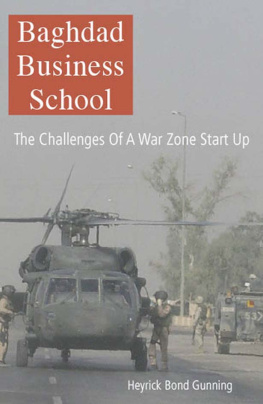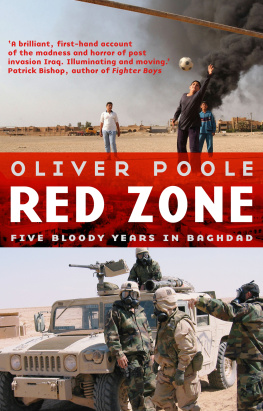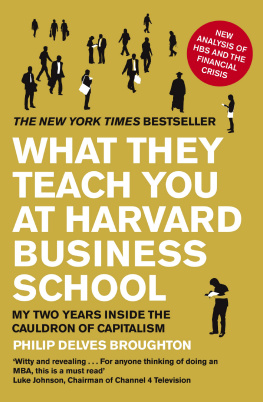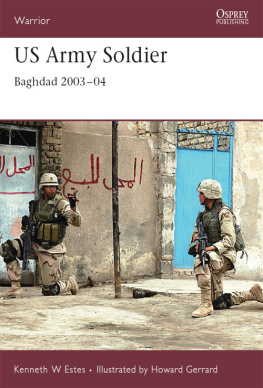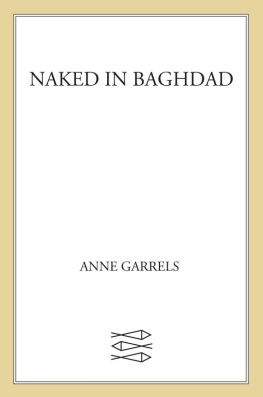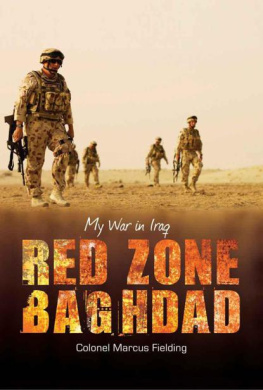

Copyright Heyrick Bond Gunning 2004
All rights reserved. Apart from brief extracts for the purpose of review, no part of this publication may be reproduced, stored in a retrieval system, or transmitted in any form or by any means, electronic, mechanical, photocopying, recording or otherwise without the permission of the publisher.
Heyrick Bond Gunning has asserted his right under the Copyright, Designs and Patents Act 1988 to be identified as the author of this work.
Baghdad Business School
First Edition
September 2004
Published by Eye Books Ltd
29 Barrow Street
Much Wenlock
Shropshire
TF13 6EN
Tel/fax: +44 (0) 20 8743 3276
website: www.eye-books.com
Set in Frutiger and Garamond
ISBN: 1903070333
British Library Cataloguing in Publication Data
A catalogue record for this book is available from the British Library
Printed and bound in Great Britain by Biddles Ltd
Cover photograph courtesy of Jennifer Glasse
To Anna
Acknowledgements
To Phil Armatage who was there from the start and who helped me retain my sanity and humour. To Dominic Herbert and Zaid for contributing with their insightful pieces. To all at DHL Iraq for working so successfully under such difficult conditions, in particular John Chisholm for his unrelenting support. To the Bahrain office, notably Phil Couchman, Fiona, Breda and Harsha for helping to make the operation run more smoothly. Finally, to Dan, Chris and Mark for all their hard work in helping to put this book together.
Contents

MAP OF IRAQ
INTRODUCTION
Do we need another book about Iraq? It often doesnt feel like it. The conflict and attempted reconstruction have already produced suffocating media coverage. The political intensity - the fading pretext for invasion - has charged it all with a wearying combativeness. It has become numbing and feels increasingly stale. And the effect has been to drive us towards an indifference about the detail of its human dimension. The mainstream story is no longer about the people on the ground, the Iraqis, the soldiers, the legions of non-Iraqis providing support services or mining the security gold rush. It has become preoccupied with the degree of blame for all its ugliness that can be thrown at George Bush, Tony Blair, and the suppliers of their alleged intelligence. All these might combine to argue for a pause for breath. But it is the alienating distortion of the story that makes another book so important, something that turns our attention back to the human elements.
The value of Baghdad Business School lies in this freshness, both its concern with the micro rather than the macro and its unique perspective on post-war Iraq. Heyrick is not a journalist, a politician, aid worker or soldier (any more). He is a businessman and has a voice and an interest in the country that we havent yet heard. His experiences were not about policy or politics. They were about the mundane and maddening frustrations of trying to set up a business in a country undergoing the trauma of post-totalitarianism. None of the agendas that underlie everything else we have seen or read or heard to date. His worries were inevitably about security but they were also about air-conditioning units, finding people to work for him, how to get a drink and the etiquette of ten-pin bowling. He had employees to motivate and a civilian job to do. And most importantly, he interacted with Iraqis not as an occupier or liberator but as the boss of a big postal company.
Therein lies another immense value in Heyricks story. Turning it around and reflecting it upon the more conventional business experience produces a joyful antidote to the epic pretension of most management theorising. No flow charts, two-by-two matrices, or clever financial models. This was just getting the job done without the luxury of time to pontificate or wallow in vacuous meetings. It was no frills business, the Land Rover school of supply chain management. Heyricks success in setting up his outfit and leaving a working legacy is testament to his composure, pragmatism, courage and wit. And its the wit that will probably be the most engaging feature of this chronicle. It is infused with a charm and warmth and a thread of gentle English eccentricity that has long been in short supply.
1 PLANNING A CAREER
Planning a successful career requires a great deal of thought and attention. Once the general career path has been identified it is essential to review all the major participants, understand their strengths and weaknesses, and narrow down the range of possibilities. Approach the firms that both suit your medium and long-term ambitions and are culturally sympathetic. Conduct a form of due diligence on them all to be prepared for any ensuing dialogue. This is no time for being impulsive - you are choosing a family as much as an employer.
(The Encyclopedia of Current Business Orthodoxy)
Monday morning, the first day back at work, after three weeks spent on a wonderful holiday in New Zealand. The phone rang, breaking my reverie and I could feel myself slipping back into the routine as if I had never been away. The next nine words were to metamorphose my rather staid existence. Are you interested in setting up DHL in Iraq? The caller, an ex colleague of mine, went on to explain that DHL was looking for someone with military and commercial experience and was keen to interview me. My initial reaction was to feel flattered, quickly followed by doubts over whether the firm had called the right man. Had DHL mistaken a rather normal career in the army for something else or had they seen one of my recently written CVs extolling my virtues as a major mover in the world of mergers and acquisitions?! In truth I had left the Grenadier Guards three years previously. Whilst in the army I had spent some time in London wearing a tunic and bearskin, carrying out public duties. As with most soldiers, I had then spent more time than I intended in Northern Ireland but was fortunate to have worked in a more unusual role which made it a little more exciting than normal soldiering. I had left the army and thought I had fallen on my feet working in a start up. My timing was impeccable - Mergermarket was a Financial Services dotcom - and I joined just as the dotcom bubble burst and the bottom fell out of the M&A market. But Mergermarket dropped the .com and went on to thrive, giving me the commercial experience DHL now found so appealing. Following an hour or two of stalling I made up my mind to go out to Bahrain for an interview.
I didnt want anyone at work to know for the obvious reasons and also in case they thought I had lost the plot entirely. Timing was key and I managed to get a flight on Tuesday night. It enabled me to get to Bahrain for Wednesday morning, have my interviews that day and be back at my desk by seven on Thursday morning, having made a miraculous recovery from my supposed bout of ill health. As it turned out the two sleepless nights meant I looked less than well and no one thought to challenge my absence. The flight out had been interesting. It was the first day of Gulf War II and unsurprisingly there were not many takers for the Gulf Air flight to Bahrain. The flight attendants outnumbered the six of us who rattled around the plane. I stretched out on a row of seats, sipped some champagne and read my notes on DHL. I had done some rather hurried research earlier in the day that ran short of finding out what the D, H & L stood for. What I did know was that it was a courier company founded by three lawyers in 1969. It had recently been bought by Deutsche Post and was keen to increase their influence in the Middle East by adding Iraq to the list of 147 countries in which it already operated.
Next page
